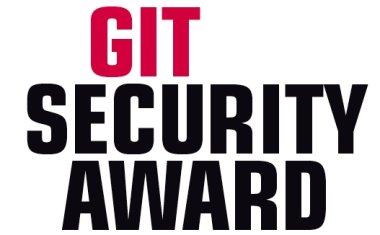Electronic Access Solution for a Luxury Hote
The Chedi Andermatt is a 5-star deluxe hotel that opened on December 6, 2013. It is the first stage of an integrated project being undertaken by Egyptian developer Samih Sawiris th...
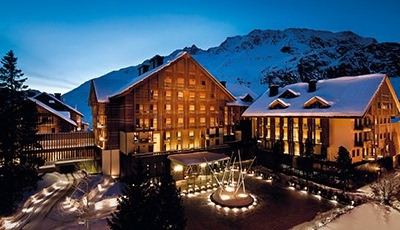
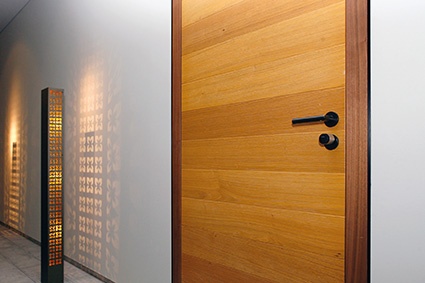
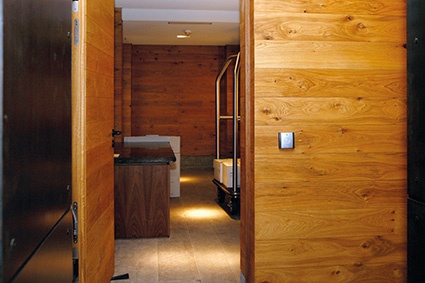
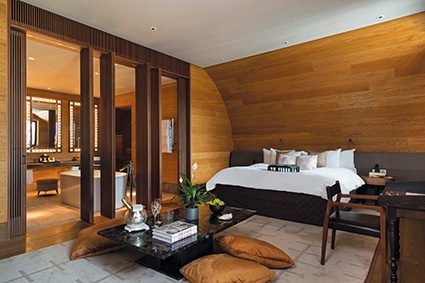
The Chedi Andermatt is a 5-star deluxe hotel that opened on December 6, 2013. It is the first stage of an integrated project being undertaken by Egyptian developer Samih Sawiris that will eventually transform the town of Andermatt into a year-round holiday destination with six hotels, 42 apartment residences, 25 chalets, a golf course and a swimming pool. The hotel required an access control system that would meet the significant operational and design demands placed upon it.
When construction work on the hotel began in 2010, no specifications had been provided indicating how guest-related procedures should be accommodated or indeed implemented. As a result, all the planning was carried out as the building work progressed, that is to say, the functional scope and the processes were defined and continuously adapted „on the fly". But the system to be installed in the Chedi Andermatt did have two major requirements placed upon it - total compatibility with the internal design and full integration in a complex building control system. And both precepts have been fulfilled with the online and offline components that make up the solution provided by Salto.
The agencies responsible for the project prepared a number of specifications based on the primary expectations of the hotel operators. „The architectural prerequisites took highest priority and were absolutely binding," recalls Thomas Hentler, Senior Project Manager at Andermatt Swiss Alps AG, the hotel developer. „Which meant the equipment had to fit in with the architecture. That not only applied to the access control installations, but they of course were also no exception. The requirement was that the guests should not be able to see the technology but that the equipment should nevertheless provide positive user support and easy facility operation. Hence we designed doors, for example, without any cable loops, which is why we have now installed wire-free mortise locks. The wall readers for the guest rooms also had to be concealed. These are now integrated in a hardwood cladding. The only things that indicate the presence of the readers are an LED peering through the paneling and a symbol on the wood."
System Interaction
Another expectation that had to be satisfied was that guests should be met by an appropriately preset ambience as they enter the room. So, for example, the fireplace, the lights and the media all had to be just right. And those various systems had to be operable not only via classic switching devices but also by means of an iPad. „This was also key to ensuring the extensive integration of the access system into the building control hierarchy. Now, for example, the door bell has an interface with the in-room iPad which every guest is provided with. Guests can also use the iPad to adjust all the settings relevant to their room such as heating or lighting levels," explains Thomas Hentler.
The master system here is the building management solution provided by Neuberger Gebäudeautomation from Geroldswil in Switzerland. The software processes all the input and output signals and gates them using specific control algorithms. Representatives of the company were always present at meetings in order to assess and examine the various integration requests and possibilities.
A further technical imperative imposed on the access control system design was that it use an IP-based network with two virtual LANs providing an online system both for the room doors and for elevator control. „Given these outline specifications, naturally we had no choice but to opt for an electronic access control system. With it, we would be able to not only deliver the required level of user convenience expected by a Chedi hotel, but also offer a wide range of benefits in terms of system management and administration. Such a solution also offers huge flexibility when it comes to changes of use and the associated reprogramming requirements, there are no costs associated with keys getting lost, and we can retrieve audit lists in real-time. This in turn means that we would be able to offer the high level of security expected by our guests as a matter of course," says Thomas Hentler as he recalls the decision-making pathway.
Choice of Hardware
Before the project was implemented, Andermatt Swiss Alps AG consulted Ronny Zaugg, Managing Director of Zaugg Schliesstechnik, Lucerne, as to what electronic access control systems might be suitable. They also visited Campus Sursee together, a modern conference center and vocational training school for the construction industry built in 2010 and located a few miles to the north of Lucerne. Zaugg was responsible for fitting around 1,100 doors of this facility with online and offline access control from Salto, including 355 hotel room doors.
In describing how Ronny Zaugg's proposal won the tender for equipping the hotel, Thomas Hentler states: „The really decisive factor was that Salto was able to provide us with a solution that corresponded precisely to our requirements. It was pretty obvious in the case of the other suppliers that they were unable to achieve the level of flexibility needed. We also decided on this solution because of the sheer range of products available, offering the single-source supply of electronic readers, cylinders and escutcheons. In addition, this system provides us with the possibility of a refit later on if there should be a change of requirements."
A further aspect of importance was the free choice of lever handles and mortise locks. The hotel had certain ideas in this respect - or rather architectural specifications - which were met to the full and without difficulty thanks to the adaptability of the solution. Thomas Hentler adds: „How people get on with one another is also an important consideration. Here we had a manufacturer able to accommodate customer requests, a partner that actively participates in the project communication process and that also shows commitment when meeting unconventional requirements - it's so much easier if you are working with someone who is seriously involved, offers good quality and is truly willing to go that extra mile."
Characterizing the approach adopted, Ronny Zaugg explains: „Our focus was not just on the sale but also on providing the customer with extensive advice while working together with the developer and operator in order to find a viable solution. You can only do that if you talk to one another and create a proper basis of trust."
The preparatory work and the planning of the installation lasted from April to November 2013, with actual installation of the access solution then taking six weeks. During this latter phase, there were no problems as such, although integration of the various systems did give rise to a number of challenges that needed to be resolved. „Ronnie Zaugg really made things happen in this regard, impressively underlining his commitment to providing a good service," says Thomas Hentler in fulsome praise.
VIP Access
The access control system in the Chedi Andermatt is largely online in the guest area so that, in particular, audit lists can be created in real-time. This facilitates immediate response whenever required - a security aspect not to be underestimated, given the fame and fortune of some of the guests. The hotel uses a total of 240 XS4 online wall readers for outside doors, room doors and the elevators. „Our stairwells are not freely accessible. That means we can isolate entire floors if, for example, we are welcoming high-ranking guests," explains Thomas Hentler.
The online system is supplemented by an offline networked infrastructure in the back office, with the Salto Virtual Network (SVN) providing the integrating, interfacing capability. For this system, Thomas Hentler has had approximately 150 XS4 Original electronic escutcheons and some 100 XS4 GEO electronic cylinders fitted. The escutcheons serve the administrative offices and the cylinders are installed in the service rooms on the various floors (e.g. storage or luggage rooms). „That means we also have controlled access to the storage areas as well," notes Thomas Hentler.
The SVN allows stand-alone locks to read, receive and write information via an encrypted and secure data-on-card system that utilizes the capabilities of patented RFID read/write technology. In an SVN environment, all access data is stored on and distributed by its operating smart card. When presenting a smart card to an offline stand-alone door, not only does this control access rights to that door but thanks to two-way communication, the door also writes data like blacklist information or battery status back to the smart card The smart card then transmits this information back to the server via online wall readers that are able to update and receive information from the cards anytime and anywhere in the building.
Trigger Mechanism
The access control system is linked not only to the building control system but also to the staff garment hand-out facility, which can only be accessed by means of a card, and also the CCTV systems monitoring the entrance doors. Certain access events trigger the transmission of video pictures to designated security monitors. The hotel uses Salto's specially developed Hotel Access Management Software (HAMS) so the management of access rights and card encoding for the employees is handled entirely within the HAMS environment. For guests, only the coding of the cards is carried out by the software where the system draws from the master data of the Micros Fidelio property management system.
Business Partner
SALTO SystemsPolígono Lanbarren, C/ Arkotz, 9
20180 Oiartzun
Spain
most read

Integrated and Futureproof: Traka’s Next Chapter
Interview with Stefni Oliver on Traka’s Vision for the Future

Assa Abloy's battery-powered Aperio KL100 secures lockers
Boost workplace security and operational flexibility by securing more than just doors.

Safety and Security in an Emergency: How companies take responsibility with strategic personal protection and amok prevention
Personal protection & amok prevention: strategic concepts, training & responsibility for corporate safety and security

When the Internet stumbles: Why DNS is important
When DNS fails, the internet stumbles-AWS outage proves resilience and redundancy are vital for digital trust


